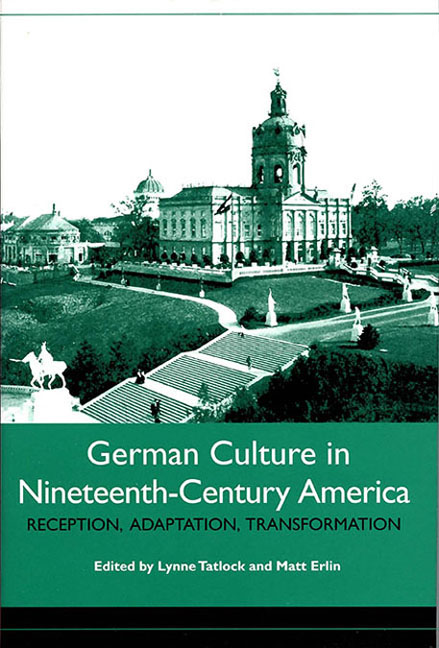45 results
17. - Conservatism
- from I - Terms
-
-
- Book:
- The Cambridge Habermas Lexicon
- Published online:
- 29 March 2019
- Print publication:
- 11 April 2019, pp 63-65
-
- Chapter
- Export citation
42. - Historians’ Debate
- from I - Terms
-
-
- Book:
- The Cambridge Habermas Lexicon
- Published online:
- 29 March 2019
- Print publication:
- 11 April 2019, pp 165-168
-
- Chapter
- Export citation
79. - The Positivism Debate
- from I - Terms
-
-
- Book:
- The Cambridge Habermas Lexicon
- Published online:
- 29 March 2019
- Print publication:
- 11 April 2019, pp 307-309
-
- Chapter
- Export citation
175. - Oskar Negt (1934– ) and Alexander Kluge (1932– )
- from II - Names
-
-
- Book:
- The Cambridge Habermas Lexicon
- Published online:
- 29 March 2019
- Print publication:
- 11 April 2019, pp 630-631
-
- Chapter
- Export citation
8 - Storytelling and Telling Stories in Heine's Prose Fiction
- from Part II - Expressions of Modernity: Using Storytelling Unconventionally
-
-
- Book:
- Dimensions of Storytelling in German Literature and Beyond
- Published by:
- Boydell & Brewer
- Published online:
- 12 April 2019
- Print publication:
- 01 December 2018, pp 111-121
-
- Chapter
- Export citation
German Studies as Vocation: My Path into It, Out of It, and Back into It
-
-
- Book:
- Transatlantic German Studies
- Published by:
- Boydell & Brewer
- Published online:
- 14 February 2019
- Print publication:
- 28 September 2018, pp 86-105
-
- Chapter
- Export citation
The structural transformation of the public sphere. Habermas Jürgen. Tr. Burger Thomas with the assistance of Frederick Lawrence. Cambridge, MA: MIT Press, 1989. Pp. xix + 301.
-
- Journal:
- American Journal of Germanic Linguistics and Literatures / Volume 3 / Issue 1 / January 1991
- Published online by Cambridge University Press:
- 05 December 2008, pp. 103-108
-
- Article
- Export citation
4 - Immigration and Naturalization Acts
-
- Book:
- German Culture in Nineteenth-Century America
- Published by:
- Boydell & Brewer
- Published online:
- 13 April 2017
- Print publication:
- 12 November 2005, pp 247-248
-
- Chapter
- Export citation
Contributors
-
- Book:
- German Culture in Nineteenth-Century America
- Published by:
- Boydell & Brewer
- Published online:
- 13 April 2017
- Print publication:
- 12 November 2005, pp 317-320
-
- Chapter
- Export citation
Contents
-
- Book:
- German Culture in Nineteenth-Century America
- Published by:
- Boydell & Brewer
- Published online:
- 13 April 2017
- Print publication:
- 12 November 2005, pp v-vi
-
- Chapter
- Export citation
2 - In Pursuit of Intellectual Culture
-
- Book:
- German Culture in Nineteenth-Century America
- Published by:
- Boydell & Brewer
- Published online:
- 13 April 2017
- Print publication:
- 12 November 2005, pp 87-88
-
- Chapter
- Export citation
3 - Translation American Style
-
- Book:
- German Culture in Nineteenth-Century America
- Published by:
- Boydell & Brewer
- Published online:
- 13 April 2017
- Print publication:
- 12 November 2005, pp 151-152
-
- Chapter
- Export citation
Nietzsche: Socialist, Anarchist, Feminist
- from 2 - In Pursuit of Intellectual Culture
-
-
- Book:
- German Culture in Nineteenth-Century America
- Published by:
- Boydell & Brewer
- Published online:
- 13 April 2017
- Print publication:
- 12 November 2005, pp 129-150
-
- Chapter
- Export citation

German Culture in Nineteenth-Century America
- Reception, Adaptation, Transformation
-
- Published by:
- Boydell & Brewer
- Published online:
- 13 April 2017
- Print publication:
- 12 November 2005
Acknowledgments
-
- Book:
- German Culture in Nineteenth-Century America
- Published by:
- Boydell & Brewer
- Published online:
- 13 April 2017
- Print publication:
- 12 November 2005, pp ix-x
-
- Chapter
- Export citation
List of Illustrations
-
- Book:
- German Culture in Nineteenth-Century America
- Published by:
- Boydell & Brewer
- Published online:
- 13 April 2017
- Print publication:
- 12 November 2005, pp vii-viii
-
- Chapter
- Export citation
Index
-
- Book:
- German Culture in Nineteenth-Century America
- Published by:
- Boydell & Brewer
- Published online:
- 13 April 2017
- Print publication:
- 12 November 2005, pp 321-336
-
- Chapter
- Export citation
Frontmatter
-
- Book:
- German Culture in Nineteenth-Century America
- Published by:
- Boydell & Brewer
- Published online:
- 13 April 2017
- Print publication:
- 12 November 2005, pp i-iv
-
- Chapter
- Export citation
1 - Cultural Politics at the Turn of the Twentieth Century
-
- Book:
- German Culture in Nineteenth-Century America
- Published by:
- Boydell & Brewer
- Published online:
- 13 April 2017
- Print publication:
- 12 November 2005, pp 1-2
-
- Chapter
- Export citation
Literary Controversy: Naming and Framing the Post-Romantic, Pre-Realist Period
- from Part II - Movements
-
-
- Book:
- German Literature of the Nineteenth Century, 1832–1899
- Published by:
- Boydell & Brewer
- Published online:
- 05 February 2013
- Print publication:
- 13 June 2005, pp 93-116
-
- Chapter
- Export citation



